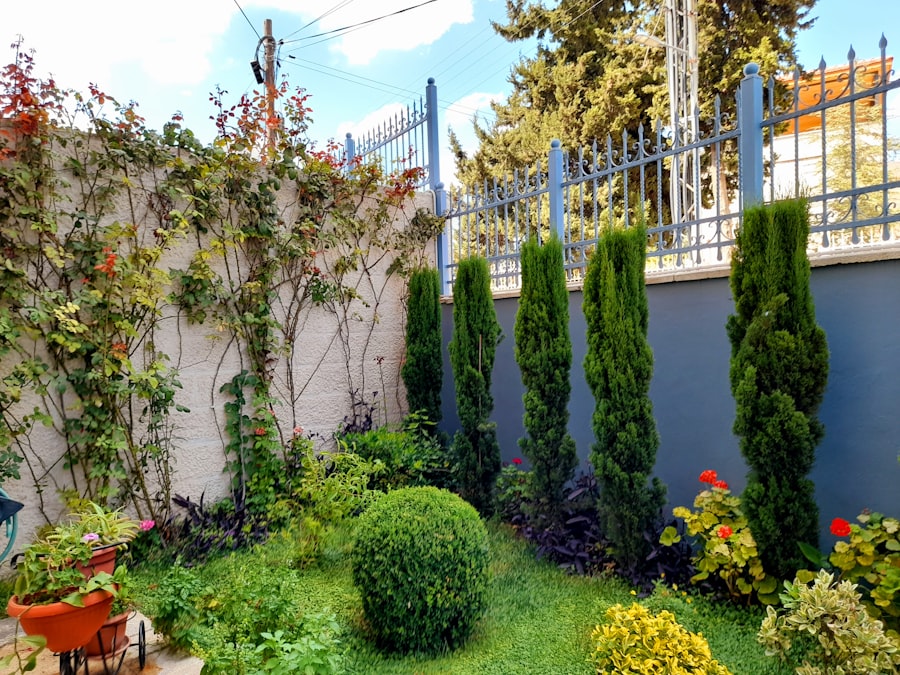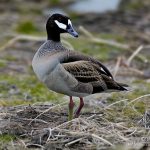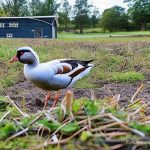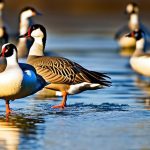Geese are large waterfowl that are known for their distinctive honking sound and V-shaped flying formation. They are highly adaptable birds that can be found in a variety of habitats, including lakes, ponds, and grassy areas. Geese are social animals that live in flocks and are known for their strong family bonds.
Understanding geese behavior is important for keeping them away from your yard. Geese can cause damage to lawns, gardens, and property with their droppings and aggressive behavior. By understanding their habits and behaviors, you can implement effective strategies to deter geese from invading your yard.
Key Takeaways
- Geese are social birds that mate for life and can live up to 25 years.
- Geese invade yards for food, shelter, and nesting sites, and can cause damage to property and pose health risks.
- Physical barriers like fences, netting, and hedges can be effective in keeping geese out of yards.
- Scare tactics like decoys, noise makers, and trained dogs can also deter geese from invading yards.
- Bird repellent devices like lasers, sprays, and sonic devices can be installed to keep geese away from yards.
Understanding the Reasons Why Geese Invade Your Yard
There are several reasons why geese may be attracted to your yard. One of the main reasons is the availability of food. Geese are herbivores and feed on grass, plants, and grains. If your yard has an abundance of these food sources, it may be more attractive to geese.
Another reason why geese may invade your yard is the presence of water. Geese need water for drinking, bathing, and nesting. If you have a pond or other water source in your yard, it may be a magnet for geese.
Geese are also attracted to open spaces where they can graze and feel safe from predators. If your yard has a large open area with minimal vegetation or obstacles, it may be more appealing to geese.
Implementing Physical Barriers to Keep Geese Out
One effective way to keep geese out of your yard is by implementing physical barriers. There are several types of physical barriers that can be used to deter geese.
Fencing is one common physical barrier that can be used to keep geese out. A fence should be at least three feet high and have small openings or mesh to prevent geese from squeezing through. It is important to make sure the fence is secure and does not have any gaps or openings that geese can exploit.
Another physical barrier that can be used is a netting system. Netting can be installed over ponds or other water sources to prevent geese from accessing the water. It is important to make sure the netting is securely fastened and does not have any gaps that geese can slip through.
Using Scare Tactics to Deter Geese
Scare tactics can be an effective way to deter geese from invading your yard. There are several scare tactics that can be used to keep geese away.
One common scare tactic is the use of noise. Geese are sensitive to loud noises and may be scared away by the sound of a horn, whistle, or other loud device. It is important to vary the noise and timing of the scare tactics to prevent geese from becoming accustomed to them.
Another scare tactic that can be used is visual deterrents. Geese are wary of unfamiliar objects and may be scared away by the presence of decoys, flags, or other visual deterrents. It is important to move these deterrents regularly to prevent geese from becoming accustomed to them.
Installing Bird Repellent Devices
Bird repellent devices can also be used to keep geese away from your yard. There are several types of bird repellent devices that can be effective in deterring geese.
One type of bird repellent device is a laser pointer. The laser pointer emits a bright light that can scare geese away. It is important to use the laser pointer responsibly and avoid shining it directly into the eyes of the geese.
Another type of bird repellent device is a sonic deterrent. Sonic deterrents emit high-frequency sounds that are unpleasant to geese and can deter them from entering your yard. It is important to place the sonic deterrents strategically and adjust the frequency to prevent geese from becoming accustomed to the sound.
Planting Vegetation that Geese Dislike

Planting vegetation that geese dislike can be an effective way to keep them away from your yard. There are several types of vegetation that geese find unappealing.
One type of vegetation that geese dislike is tall grass. Geese prefer short grass that is easy to graze on, so planting tall grass can make your yard less attractive to them. It is important to regularly mow and maintain the tall grass to prevent it from becoming overgrown.
Another type of vegetation that geese dislike is prickly plants. Geese do not like plants with thorns or spines, so planting prickly bushes or shrubs can deter them from entering your yard. It is important to choose plants that are native to your area and can thrive in your climate.
Removing Food Sources that Attract Geese
Removing food sources that attract geese is an important step in keeping them away from your yard. There are several types of food sources that geese are attracted to.
One common food source for geese is grass. Geese feed on grass and can cause damage to lawns and gardens with their grazing. It is important to regularly mow and maintain your lawn to prevent it from becoming overgrown and attractive to geese.
Another food source for geese is grains and seeds. If you have bird feeders or other sources of grains or seeds in your yard, it may be attracting geese. It is important to remove these food sources or place them in areas where geese cannot access them.
Creating an Unwelcoming Environment for Geese
Creating an unwelcoming environment for geese can help deter them from invading your yard. There are several ways to create an environment that geese find unwelcoming.
One way to create an unwelcoming environment is by introducing obstacles. Geese prefer open spaces where they can graze and feel safe from predators. By adding obstacles such as rocks, shrubs, or fences to your yard, you can make it less appealing to geese.
Another way to create an unwelcoming environment is by using repellents. There are several types of repellents that can be used to deter geese, including taste repellents and scent repellents. It is important to choose repellents that are safe for the environment and do not harm other wildlife.
Enlisting Professional Help to Manage Geese
If you are unable to effectively manage geese on your own, it may be necessary to seek professional help. There are several types of professionals that can assist with geese management.
One type of professional that can help manage geese is a wildlife control specialist. These professionals are trained in humane methods of wildlife control and can help remove geese from your property.
Another type of professional that can assist with geese management is a landscape architect. These professionals can help design and implement landscaping strategies that deter geese from entering your yard.
Conclusion and Final Tips for Keeping Geese Away
In conclusion, understanding geese behavior and implementing effective strategies can help keep them away from your yard. By using physical barriers, scare tactics, bird repellent devices, planting vegetation that geese dislike, removing food sources, creating an unwelcoming environment, and enlisting professional help when necessary, you can successfully manage geese and protect your property. Remember to regularly assess and adjust your strategies as needed to ensure long-term success in keeping geese away from your yard.
If you’re looking for ways to keep geese out of your yard, you may also be interested in learning about the breeding habits of guinea fowl. Guinea fowl are known for their ability to ward off unwanted pests, including geese. Understanding when guinea fowl lay eggs can help you strategically plan your yard maintenance to deter geese from settling in. To learn more about guinea fowl breeding and egg-laying patterns, check out this informative article: When Do Guinea Fowl Lay Eggs?
FAQs
What are some common reasons why geese enter yards?
Geese may enter yards in search of food, water, or nesting sites. They may also be attracted to open spaces or bodies of water.
What are some effective ways to keep geese out of my yard?
Some effective ways to keep geese out of your yard include installing physical barriers such as fences or netting, using decoys or scare tactics, and removing any sources of food or water.
Are there any humane methods for keeping geese out of my yard?
Yes, there are several humane methods for keeping geese out of your yard. These include using noise deterrents, such as air horns or whistles, and using visual deterrents, such as reflective tape or balloons.
Is it legal to harm or kill geese that enter my yard?
In most cases, it is illegal to harm or kill geese that enter your yard. Geese are protected under federal and state laws, and penalties for harming or killing them can be severe.
What should I do if I encounter an injured or sick goose in my yard?
If you encounter an injured or sick goose in your yard, it is best to contact a local wildlife rehabilitation center or animal control agency. Attempting to handle or care for the goose yourself can be dangerous and may further harm the animal.
Meet Walter, the feathered-friend fanatic of Florida! Nestled in the sunshine state, Walter struts through life with his feathered companions, clucking his way to happiness. With a coop that’s fancier than a five-star hotel, he’s the Don Juan of the chicken world. When he’s not teaching his hens to do the cha-cha, you’ll find him in a heated debate with his prized rooster, Sir Clucks-a-Lot. Walter’s poultry passion is no yolk; he’s the sunny-side-up guy you never knew you needed in your flock of friends!







